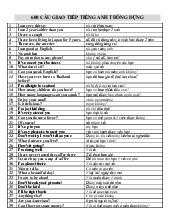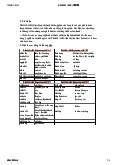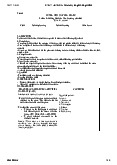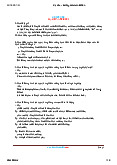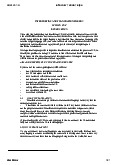






Preview text:
17:33 29/7/24
Guidelines for Lawyers in Mediations Final 16 May 2019 Guidelines for Lawyers in Mediations about:blank 1/7 17:33 29/7/24
Guidelines for Lawyers in Mediations Final 16 May 2019
The Law Council of Australia has developed these guidelines to give assistance to
lawyers representing clients in the mediation of civil and commercial disputes. It is not
intended that the guidelines derogate in any way from the usual obligations imposed on
lawyers by law or any ethical rules, professional conduct rules or standards. It is expected
that the guidelines will be reviewed from time to time.
These guidelines are based on the work of the members of the Law Council of Australia
Expert Standing Committee on Alternative Dispute Resolution: Mary Walker Alan Limbury Michael Hollingdale Michael Klug Nadja Alexander Henry Jolson QC Laurence Boulle
Phillip Theobald Joanne Staugas Ian Hanger AM QC Geoff Gronow
These guidelines were reviewed and updated by the Committee in August 2011: Mary Walker Ian Bloemendal Laurence Boulle Scott Ellis Geri Ettinger Catherine Gale David Gaszner George Golvan QC Michael Kent SC Kathy Mack Tim McFarlane Joanne Staugas Philip Theobald
These guidelines were reviewed and updated by the Committee in April 2018: Mary Walker
Ian Bloemendal Anthony Nolan QC Scott Ellis Geri Ettinger Michael Hollingdale George Golvan QC Tim McFarlane Joanne Staugas Philip Theobald about:blank 2/7 17:33 29/7/24
Guidelines for Lawyers in Mediations Final 16 May 2019
A lawyer’s role in mediation is to assist clients, provide practical and legal advice
on the process and on issues raised and offers made, and to assist in drafting
terms and conditions of settlement as agreed.
A lawyer’s role will vary greatly depending on the nature of the dispute and the
mediation process. It may range from advising a client before a mediation, to
representing a client during a mediation and undertaking all communications on behalf of a client.
At all times, a lawyer must pay due regard to the duties owed as an officer of the
court and in the administration of justice. 2. Ethical Issues 2.1 Confidentiality
As with all dealings with clients, anything that is said or done in a mediation is
strictly confidential. In addition, subject to the requirements of the law and any
relevant Rules of Court, a lawyer must maintain the confidentiality required by the
parties and by any mediation agreement. Comment (a)
A lawyer must not disclose any information disclosed during the mediation
unless such disclosure is required by law. (b)
Without prior permission of the mediator and the other parties a lawyer
must not reveal any information disclosed by the mediator during private
sessions to the other parties or their legal representatives. (c)
All information and documents disclosed during the mediation, including
any settlement or draft offers/counter-offers, are confidential and privileged
between parties to the mediation and their legal representatives. (d)
A lawyer should consider rules about confidentiality (which may vary from
jurisdiction to jurisdiction) before attending a pre-mediation conference so
that they may be established by the parties and the mediator at the pre- mediation conference. 2.2 Good faith
Lawyers and clients should act, at all times, in good faith to attempt to achieve settlement of the dispute. Comment (a)
A lawyer should advise clients about what it means to act in good faith. A
lawyer should not continue to represent clients who act in bad faith or give
instructions which are inconsistent with good faith. about:blank 3/7 17:33 29/7/24
Guidelines for Lawyers in Mediations Final 16 May 2019
in bad faith this should be raised privately at first with the mediator. 3. When to Mediate
Timing is an important factor in establishing a framework conducive to settlement.
There is no conclusive rule as to whether, or when, a case is suitable for
mediation. Various factors should be considered, including the nature of the
dispute and the mindsets of the parties. Comment (a)
Most cases are suitable for mediation at some point in time. Costs of
litigation are a persuasive factor in favour of mediation. (b)
Mediation may be undertaken at any time and should be considered: (i)
before proceedings are commenced; (ii)
after pleadings have closed, but before the costs of discovery are incurred; (iii)
before an action is set down for trial and trial costs are incurred; and
(iv) after a trial and before judgment. 4. Selecting the Mediator
Agreeing selection and engagement of the most suitable mediator will enhance
clients’ settlement prospects in the mediation. Comment When selecting a mediator: (a)
first look to a mediator’s skill and experience as a mediator, and then to
any additional qualifications that may be helpful, such as expertise in the
subject matter of the dispute or law; (b)
consider the role of the mediator and whether a particular style of
mediation may be better suited to the dispute.
5. Preparing for the Mediation
Preparation for a mediation is as important as preparing for trial. A lawyer should
look beyond the legal issues or quantum and consider the dispute in a broader,
practical and commercial context. Comment
Litigation defines the issues by pleadings. Before a mediation, a lawyer should, as
well as assessing the legal merits of the case, consider the dispute in commercial about:blank 4/7 17:33 29/7/24
Guidelines for Lawyers in Mediations Final 16 May 2019
generate possible practical options for resolution. 5.1 Preparing your client
A lawyer’s primary task is to help prepare clients for a mediation by: (i)
undertaking a risk analysis and linking risks to the client’s interests; (ii)
explaining the nature of mediation; (iii) identifying interests; and (iv)
developing strategies to achieve final outcomes. Comment (a)
Assist clients to complete a risk analysis. A draft risk analysis may be
discussed with clients and then reviewed with the legal team. A risk
analysis will assist in determining a range of options for settlement. (b)
Discuss and explain the mediation process and role of the mediator to
clients. In particular, discuss issues such as confidentiality and the nature
of ‘without prejudice’ negotiations. (c)
Help clients identify positions and interests and the best ways to achieve
outcomes. It is useful to consider the interests of other parties and ways to
overcome any tactics or objections likely to arise. (d)
Decide who will do the talking in the mediation. Often, with appropriate
preparation, clients will be in the best position to convey facts and other
non-legal issues. If so, a lawyer may need to assist clients with preparation for their involvement.
5.2 Conference with the Mediator
Pre-mediation conferences convened by the mediator are a good opportunity to
establish a relationship with the mediator and arrange any practical matters
relevant to convening the mediation. Comment (a)
The first mediation conference is usually between the lawyers and the
mediator and covers procedural details concerning the mediation such as
the date, time, place, fees, persons attending, the mediation agreement
and documents to be exchanged or brought to the mediation.
Rules about confidentiality must be established and documented. One
option is to agree that confidentiality commences at the time of the
preliminary conference and relates to the entirety of the mediation process
from that time, including correspondence and post-mediation reporting requirements. about:blank 5/7 17:33 29/7/24
Guidelines for Lawyers in Mediations Final 16 May 2019
mediation at which the mediator can meet individually with the parties and their lawyers.
This conference enables the mediator to establish a relationship with
clients, explain the process, format and structure of the mediation, and
answer any questions before the mediation commences. 6. At the Mediation
Mediation is not an adversarial process to determine who is right and who is
wrong. Mediation should be approached as a problem-solving exercise. A lawyer’s
role is to help clients to best present their case and assist clients and the mediator
by giving practical and legal advice and support. 6.1 Skills
The skills required to effectively represent a client at mediation differ from those
used in trial advocacy. In litigation a lawyer’s objective is to persuade the decision-
maker to accept the arguments advanced by the lawyer and to find in favour of the
lawyer’s client. In mediation, a lawyer’s objective is to use advocacy skills, which are
best applied to persuading the other parties and their lawyers that settlement
options proposed by the lawyer’s clients would better meet the legitimate interests of
all parties. To that end, lawyers are encouraged to consider the options and
interests of other parties, as well as their clients, and assist the parties in dispute
to appreciate that a mutual resolution, not an imposed judgment or
determination, would best satisfy their interests. Comment (a)
Arguments presented in terms and language that is persuasive to the other
party are preferred. Legal arguments or language are not always necessary. (b)
Listening carefully, even to material which may be irrelevant to litigation
may be conducive to setting an atmosphere for settlement. It can be helpful
to acknowledge arguments made against clients to show that the other
party’s position has been heard and understood. 6.2 Offers and Settlement
A primary aspect of a lawyer’s role is to help formulate offers, assess the
practicality/reasonableness of offers made by other parties and assist in drafting
settlement terms and conditions. Comment (a)
Never mislead or knowingly make a false statement to an opponent and be careful of puffery. about:blank 6/7 17:33 29/7/24
Guidelines for Lawyers in Mediations Final 16 May 2019 (b)
Be cautious about making a ‘final offer’ or delivering ultimatums which can
limit future options and damage credibility for future negotiations. (c)
It may be helpful to have available a draft settlement agreement at the mediation.
(d) If it appears that the mediation will not produce a final settlement, try to obtain
a written agreement on as many outstanding issues as possible. This may
advance future negotiations or shorten a trial and leaves parties feeling like
they have at least achieved something useful. It is helpful for future purposes
to draft a list of issues on which agreement has not been reached. 6.3 Professional Conduct
Legal representatives owe their opponents general duties of respect, fairness and courtesy.
Lawyers must act in a professional manner and respect and obey the law including
their professional rules of conduct.
Lawyers must not engage in, or assist conduct that is illegal or dishonest or
otherwise discreditable to a practitioner, prejudicial to the administration of justice
or which might otherwise ‘bring the profession into disrepute’.
Lawyers must not engage in misleading conduct. Lawyers should ensure that they
do not take unfair advantage of an obvious error of another lawyer or person. 7. Post-Mediation
Generally, lawyers should report on mediation in writing to clients. Lawyers may
also need to address with clients (before the mediation) any reporting obligations
the mediator may have to courts, government departments or other organisations. Comment
A lawyer should be aware of any post-mediation reporting obligations (which may
vary from jurisdiction to jurisdiction) before attending a pre-mediation conference. about:blank 7/7
